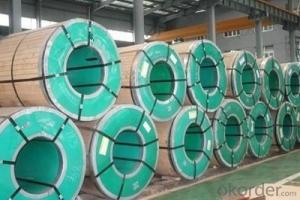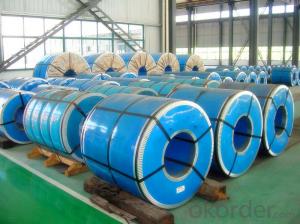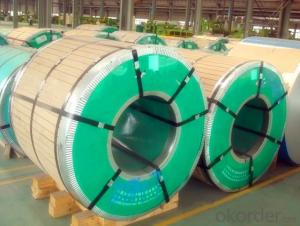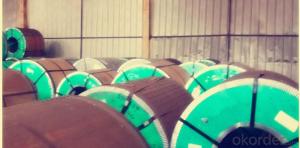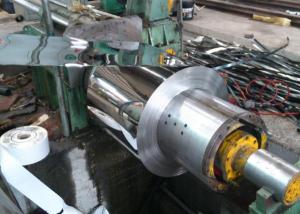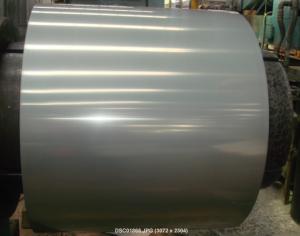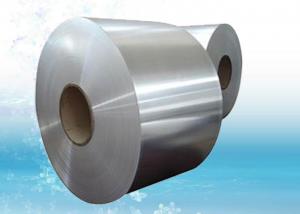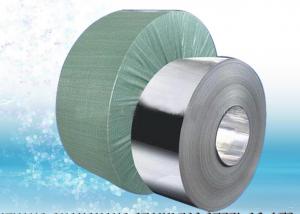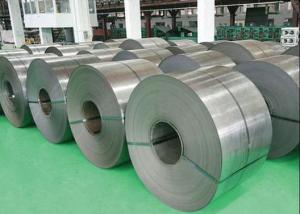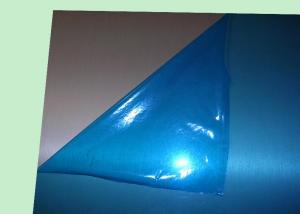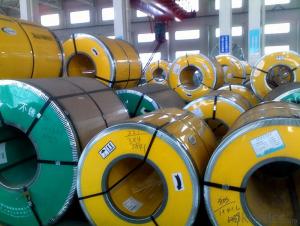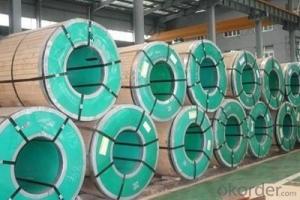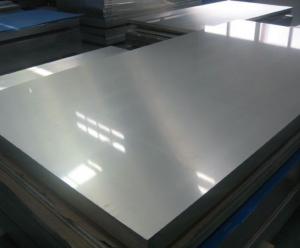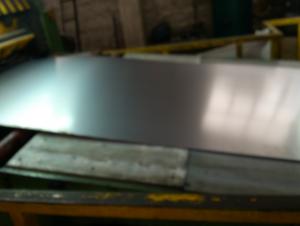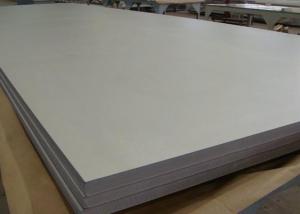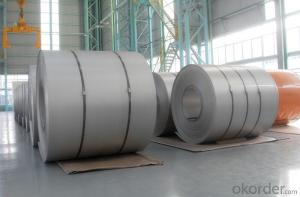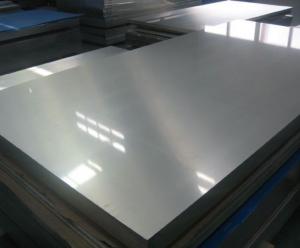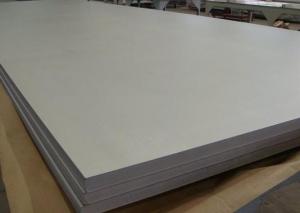Stainless Steel Coil 304 Hot/Cold Rolled 2B/BA/NO.1
- Loading Port:
- Guangzhou
- Payment Terms:
- TT OR LC
- Min Order Qty:
- 100 m.t.
- Supply Capability:
- 20000 m.t./month
OKorder Service Pledge
OKorder Financial Service
You Might Also Like
Hot Rolled Stainless Steel Coil 304
Annealing and Pickling No.1 Finish
Stainless steel is a production which not easy rust,acid resistance and corrosion resistance,so it is widely
used in light industry,heavy industry,daily necessities and the decoration industry.
Hot Rolled Stainless Steel Coil 304 Specifications
1.surface:NO.1
2.standard:JIS, AISI, GB
3.width: 0.55m, 0.65m, 1.0m, 1.22m, 1.5m, 2m or requirement
Hot Rolled Stainless Steel Coil 304 Chemical Composition:
(%):C=0.07, Mn=2.00, P=0.045, S=0.030, Si=0.075, Cr=17.5-19.5, Ni=8.0-10.5, N=0.10
Hot Rolled Stainless Steel Coil 304 Physical Properties
Tensile strength σb (MPa) ≥ 520
the conditions yield strength σ0.2 (MPa) ≥ 205,
elongation δ5 (%) ≥ 40
Reduction of ψ (%) ≥ 50,
hardness: ≤ 187
HB; ≤ 90
HRB; ≤ 200H
- Q:What's the difference between stainless steel coil and stainless steel plate?
- Because of the difference in the chemical composition of the two, and make their corrosion resistance is different, ordinary stainless steel is generally not resistant to chemical medium corrosion, and acid resistant steel are generally stainless steel.
- Q:What are the common uses of stainless steel strips in the pharmaceutical packaging industry?
- The pharmaceutical packaging industry relies on stainless steel strips for various purposes. One primary use involves the manufacturing of packaging containers and components. Different types of containers, including vials, ampoules, and syringes, are made from stainless steel strips due to their ability to resist corrosion, withstand high temperatures, and maintain sterility. By choosing stainless steel, the industry ensures the safety and integrity of the packaged drugs. Moreover, stainless steel strips are also employed in the production of packaging components like lids, caps, and closures. These components are crucial in preserving the quality and freshness of pharmaceutical products. Stainless steel's resistance to rust and its ability to create an airtight seal are essential in guaranteeing the integrity of the packaged medications. Additionally, stainless steel strips find use in constructing pharmaceutical machinery and equipment. The manufacturing processes often involve heavy machinery that requires durable and corrosion-resistant materials. Stainless steel strips are frequently used to fabricate machine parts, conveyor systems, and packaging equipment, ensuring their longevity and reliability. Another common application of stainless steel strips in the pharmaceutical packaging industry is for labeling and identification purposes. Important information such as batch numbers, expiration dates, and drug identification codes can be engraved or etched onto stainless steel strips. This ensures accurate tracking, tracing, and identification of the pharmaceutical products throughout the packaging and distribution process. In summary, stainless steel strips offer numerous advantages in the pharmaceutical packaging industry. Their corrosion resistance, durability, and ability to maintain sterility make them essential for manufacturing containers, components, machinery, and labeling in the sector.
- Q:Can stainless steel strips be used in the pharmaceutical equipment industry?
- Yes, stainless steel strips can be used in the pharmaceutical equipment industry. Stainless steel is a commonly used material in this industry due to its corrosion resistance, durability, and ease of cleaning. Stainless steel strips are often used to manufacture components such as tanks, vessels, piping, and fittings that come into direct contact with pharmaceutical products.
- Q:Can 111 stainless steel strips be polished to a mirror-like finish?
- Yes, 111 stainless steel strips can be polished to a mirror-like finish.
- Q:Can 111 stainless steel strips be used in the chemical processing industry?
- In the chemical processing industry, it is possible to utilize 111 stainless steel strips. These stainless steel strips belong to the 300 series, which is renowned for its exceptional resistance to corrosion. Consequently, they are well-suited for environments with high chemical levels and corrosive substances. Moreover, 111 stainless steel strips possess commendable strength, toughness, and formability, rendering them suitable for a variety of applications in the chemical processing industry, including tanks, pipes, valves, and other equipment. Nevertheless, it is crucial to consider the particular requirements and conditions of a given chemical processing operation to ensure that 111 stainless steel is both compatible and appropriate for the specific application.
- Q:What is the melting point of stainless steel strips?
- The melting point of stainless steel strips is subject to variation based on the specific alloy employed. Typically, the melting point of stainless steel strips falls within the range of 2,500 to 2,800 degrees Fahrenheit (1,370 to 1,540 degrees Celsius). Nevertheless, it should be emphasized that dissimilar grades or compositions of stainless steel might possess marginally diverse melting points.
- Q:Can stainless steel strips be used in water treatment plants?
- Yes, stainless steel strips can be used in water treatment plants. Stainless steel is known for its corrosion resistance, making it suitable for applications in water treatment plants where it will be exposed to water and various chemicals. It provides durability and long-lasting performance, making it an ideal material for components and structures used in water treatment processes.
- Q:What are the factors affecting the electrical resistivity of 111 stainless steel strips?
- The electrical resistivity of 111 stainless steel strips can be affected by various factors. 1) Composition: The chemical composition, including the presence of different alloying elements, can significantly impact the electrical resistivity. The atomic structure and arrangement can be altered by these elements, thus affecting the movement of electrons and the overall resistivity. 2) Temperature: Changes in temperature can cause variations in the electrical resistivity. Generally, resistivity tends to increase as the temperature rises due to increased thermal vibrations of atoms, which hinder the electron flow. 3) Microstructure: Factors such as grain size, grain boundaries, and dislocations in the microstructure can influence the electrical resistivity. For example, a smaller grain size can lead to higher resistivity due to increased scattering of electrons at grain boundaries. 4) Impurities and Defects: Impurities and defects within the stainless steel structure can affect resistivity. Impurities can create localized regions with different electrical properties, resulting in variations in resistivity. Similarly, defects like dislocations can impede the flow of electrons, increasing resistivity. 5) Processing and Heat Treatment: The manufacturing process and subsequent heat treatment of stainless steel strips can modify their electrical resistivity. Cold working, annealing, and quenching can alter the microstructure and introduce changes in resistivity. 6) Magnetic Field: The application of a magnetic field can also influence the electrical resistivity. The interaction between the magnetic field and the electrons in the material can alter their motion, resulting in changes in resistivity. In conclusion, the electrical resistivity of 111 stainless steel strips is determined by factors such as composition, temperature, microstructure, impurities, processing, and the presence of a magnetic field. Understanding and controlling these factors is crucial for engineering stainless steel strips with specific electrical resistivity properties.
- Q:Are stainless steel strips suitable for roofing applications?
- Yes, stainless steel strips are suitable for roofing applications. Stainless steel is highly resistant to corrosion, making it an excellent choice for roofing materials, especially in areas with harsh weather conditions or high levels of pollution. Stainless steel strips offer durability, longevity, and low maintenance requirements, making them a cost-effective option in the long run. Additionally, stainless steel has a high strength-to-weight ratio, which means it can withstand heavy loads without compromising the structural integrity of the roof. Furthermore, stainless steel strips are fire-resistant and can effectively reflect sunlight, reducing heat absorption and energy costs. Overall, stainless steel strips are a reliable and practical choice for roofing applications.
- Q:Can stainless steel strips be used in the production of chemical tanks?
- Yes, stainless steel strips can be used in the production of chemical tanks. Stainless steel is known for its excellent corrosion resistance, making it a suitable material for holding and transporting various chemicals. The use of stainless steel strips in the construction of chemical tanks ensures durability, longevity, and resistance against chemical reactions that can occur within the tanks. Additionally, stainless steel's strength and ability to withstand high temperatures make it a reliable choice for storing and transporting chemicals safely.
1. Manufacturer Overview |
|
|---|---|
| Location | |
| Year Established | |
| Annual Output Value | |
| Main Markets | |
| Company Certifications | |
2. Manufacturer Certificates |
|
|---|---|
| a) Certification Name | |
| Range | |
| Reference | |
| Validity Period | |
3. Manufacturer Capability |
|
|---|---|
| a)Trade Capacity | |
| Nearest Port | |
| Export Percentage | |
| No.of Employees in Trade Department | |
| Language Spoken: | |
| b)Factory Information | |
| Factory Size: | |
| No. of Production Lines | |
| Contract Manufacturing | |
| Product Price Range | |
Send your message to us
Stainless Steel Coil 304 Hot/Cold Rolled 2B/BA/NO.1
- Loading Port:
- Guangzhou
- Payment Terms:
- TT OR LC
- Min Order Qty:
- 100 m.t.
- Supply Capability:
- 20000 m.t./month
OKorder Service Pledge
OKorder Financial Service
Similar products
New products
Hot products
Related keywords
